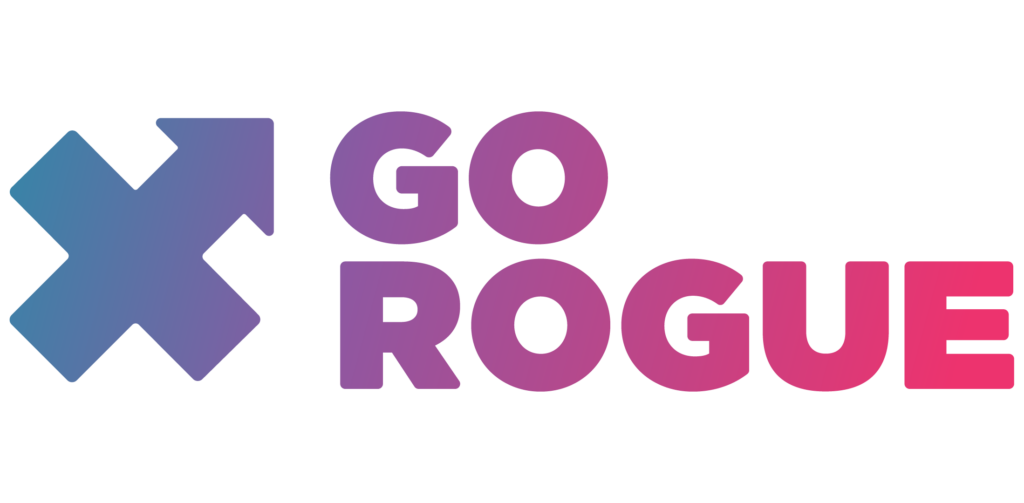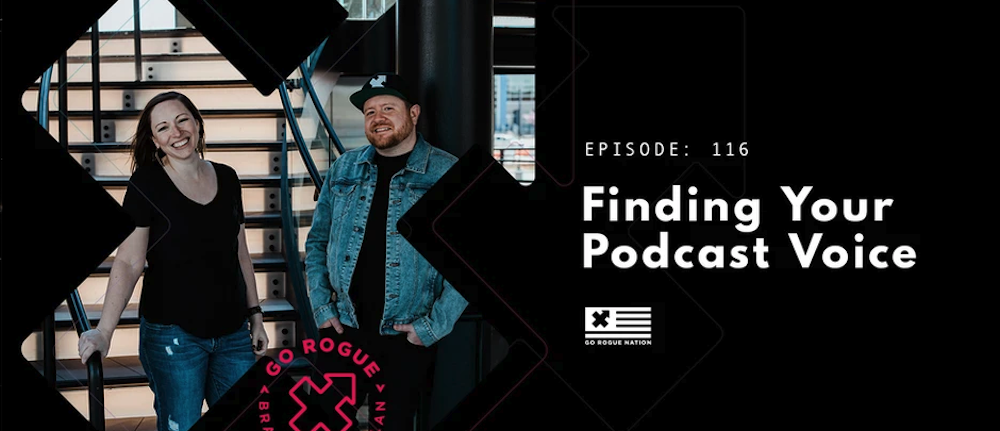Welcome to another episode of Rogue Creators! In this episode, Bryan Fittin and Loren Lewis discuss how you can find your podcast voice. We spend so much time talking about how to make content engaging, and your voice plays a critical role in this. How can you use tone, cadence, and dialogue style to make your podcast engaging for your audience? Tune in to figure out!
Shownotes
(1:21) What are you obsessed with?
(4:49) Do your research!
(9:44) Stay true to your brand
(14:26) Go for it!
(19:38) Rapid Fire
Links
Quotes
“There’s things that people do in their natural cadence of their voice that can actually be very off-putting for a lot of people. And so it’s learning to identify those things and also make sure that you are going to really have your brand coming through the microphone.” (5:12)
“Some people are just naturally gifted – they have kind of that radio voice, and they’re just a little bit more natural behind the mic. And then there are other people that have to work at it a little bit more, and there’s no shame in having to practice your voice and really research that. You’re just trying to do what’s best for your audience.” (8:41)
“Make sure that your company, that you’re highlighting all the great things about your culture, so that way people can get to know you through audio format or video format.” (11:02)
“Finding that voice in your own podcast, if it is very buttoned up and you want to stay on a script, that is ideal to make sure everybody is on the same page and it’s less conversational.” (13:01)
“Make sure that your own insecurities don’t get in the way of people receiving that information or help that only you can give.” (15:49)
Finding Your Podcasting Voice
The idea of starting your own podcast has never seemed as possible as it does today, and people are jumping on the bandwagon left and right. While creating a podcast is accessible for most, it isn’t always sunshine and rainbows. As you prepare for the launch of your show, you are bound to run into several challenges, finding the right voice for your podcast being one of the most intimidating.
New podcasters typically focus heavily on the content of their show. What will they talk about? Will there be a structured format, or will it be free-flowing and conversational? They’ll consider these questions among many others in their preparation, but they often won’t think about their tone and voice until they sit down to record their first episode.
So, you’re interested in starting a podcast, but you don’t have any training or experience behind a microphone? Follow these tips to ensure your podcast voice helps engage your listeners!
Do Your Research
Nearly every time we offer tips and advice for content creators, we start with this simple step: Do your research. After all, how can we create, curate, and practice being the best without knowing what the best looks and sounds like?
What are a few of your favorite podcasts? As you listen to them, consider what it is about the host(s) that you find engaging and enjoyable to listen to. Do you think these same qualities will be appealing to your audience too? If so, let them carry over into your tone, cadence, and style. Mimicking different elements of your favorite podcasters is a fantastic way to establish the foundation of your podcasting voice.
“Some people are just naturally gifted – they have kind of that radio voice, and they’re just a little bit more natural behind the mic. And then there are other people that have to work at it a little bit more, and there’s no shame in having to practice your voice and really research that. You’re just trying to do what’s best for your audience.” (8:41)
Another part of researching is learning what things are unpleasant for your audience to listen to. Regular, face-to-face conversation allows for plenty of things that simply don’t pass in audio and video podcasting. Mouth clicks, deep breaths, long pauses, and repetitive vocals ticks (constantly saying “um,” “but yeah,” “and so,” or any other filler words/phrases that you continuously use) have the potential to make podcasts unlistenable. While you or your editor can remove them during the editing process, it is always best to cut them out of your regular speech patterns.
“There’s things that people do in their natural cadence of their voice that can actually be very off-putting for a lot of people. And so it’s learning to identify those things and also make sure that you are going to really have your brand coming through the microphone.” (5:12)
Stay True to Your Brand
We consult with several B2B brands, and one of the most significant pieces of advice we give them is to make sure that their podcast stays true to who they are as a company. If your business is laid back, fun, and relaxed, you don’t want your podcast to be buttoned-up and formal because that wouldn’t accurately represent your brand.
“Finding that voice in your own podcast, if it is very buttoned up and you want to stay on a script, that is ideal to make sure everybody is on the same page and it’s less conversational.” (13:01)
If you are a business that sticks to more traditional workplace standards and culture, keeping your podcast scripted and formal is a great way to project that professionalism to the world. Progressive startups with nonchalant, informal cultures can utilize a conversational, fun, and amusing tone to engage with an audience looking for those qualities.
“Make sure that your company, that you’re highlighting all the great things about your culture, so that way people can get to know you through audio format or video format.” (11:02)
Just Go for It!
So many content creators are interested in starting a podcast but ultimately decide not to because they don’t like the sound of their voice. We’ve all experienced that moment. You watch a video of yourself talking, but you don’t hear the voice you associate with yourself. You start to ask yourself: Do I always sound like that? Is this what everyone else thinks I sound like?
This happens to so many potential podcasters, and they allow it to hold them back from starting their show. The truth is, you might not be used to your voice, but everyone else is. After a few episodes, you’ll find that the voice you hear starts to sound more and more like your own.
“Make sure that your own insecurities don’t get in the way of people receiving that information or help that only you can give.” (15:49)
Everyone has something worth saying and an audience that wants to hear it. Don’t rob listeners of the chance to listen to what you have to say!
Are you interested in starting a podcast to promote your brand? Schedule a call with us today!


